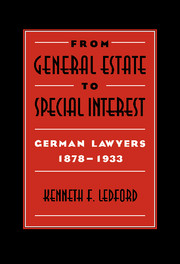Book contents
- Frontmatter
- Contents
- List of Illustrations
- Hierarchy of Courts
- Glossary of Legal and Other Terms
- Abbreviations
- Preface
- 1 The Archimedean Point: Lawyers, Liberalism, and the Middle-Class Project
- 2 Freie Advokatur: The Blending of the Middle-Class and Professional Projects
- 3 Foundation of the Modern Profession: The Private Bar under the Lawyers' Statute
- 4 Institutional Framework: Lawyers and Honoratiorenpolitik
- 5 Growth and Diversification: Lawyers in the Province of Hannover, 1878–1933
- 6 Elites and Professional Ideology: Self-Discipline and Self-Administration by the Anwaltskammer Celle
- 7 Simultaneous Admission: The Limits of Honoratiorenpolitik
- 8 The Limits of Economic Liberalism: Freie Advokatur or Numerus Clausus?
- 9 The Limits of Political Liberalism: Lawyers and the Weimar State
- 10 Conclusion: Lawyers and the Limits of Liberalism
- Methodological Appendix
- Bibliography
- Index
3 - Foundation of the Modern Profession: The Private Bar under the Lawyers' Statute
Published online by Cambridge University Press: 11 September 2009
- Frontmatter
- Contents
- List of Illustrations
- Hierarchy of Courts
- Glossary of Legal and Other Terms
- Abbreviations
- Preface
- 1 The Archimedean Point: Lawyers, Liberalism, and the Middle-Class Project
- 2 Freie Advokatur: The Blending of the Middle-Class and Professional Projects
- 3 Foundation of the Modern Profession: The Private Bar under the Lawyers' Statute
- 4 Institutional Framework: Lawyers and Honoratiorenpolitik
- 5 Growth and Diversification: Lawyers in the Province of Hannover, 1878–1933
- 6 Elites and Professional Ideology: Self-Discipline and Self-Administration by the Anwaltskammer Celle
- 7 Simultaneous Admission: The Limits of Honoratiorenpolitik
- 8 The Limits of Economic Liberalism: Freie Advokatur or Numerus Clausus?
- 9 The Limits of Political Liberalism: Lawyers and the Weimar State
- 10 Conclusion: Lawyers and the Limits of Liberalism
- Methodological Appendix
- Bibliography
- Index
Summary
The process of legal unification of the German Empire was a long one, culminating with the adoption of the Civil Law Code in 1896, effective in 1900, but the first peak, of crucial importance for the organization of the legal profession, came in the years 1877–9. The Imperial Justice Laws, which the Reichstag adopted between January 1877 and July 1879, and which entered into effect together on 1 October 1879, unified the legal system of the new German Empire and changed the lives of all lawyers practicing in the country. Contemporaries viewed these statutes as an interrelated whole, and they must be read together in order to understand fully the framework governing the organization of the private practice of law.
This chapter traces first the legislative history of the Imperial Justice Laws, particularly of the Lawyers' Statute (“RAO”), to show how the enactment of the reform legislation intersected with the professional and middle-class projects for reform. Then it explains the legislative framework that the laws created, under which the private legal profession structured itself and operated essentially unchanged until 1933. Both discussions will pay particular attention to inchoate tensions within the bar that the reform legislation created, setting the stage for an exploration in later chapters of how these tensions ripened and manifested themselves, creating internal and external difficulties for the private bar and interfering with its ability to succeed in either the professional or middle-class project.
- Type
- Chapter
- Information
- From General Estate to Special InterestGerman Lawyers 1878–1933, pp. 59 - 86Publisher: Cambridge University PressPrint publication year: 1996
- 1
- Cited by



